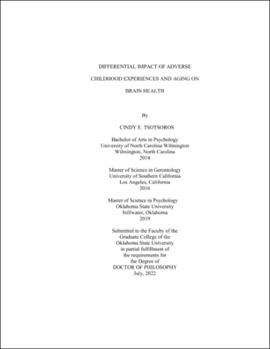| dc.contributor.advisor | Hawkins, Misty A. W. | |
| dc.contributor.author | Tsotsoros, Cindy E. | |
| dc.date.accessioned | 2023-04-05T16:21:25Z | |
| dc.date.available | 2023-04-05T16:21:25Z | |
| dc.date.issued | 2022-07 | |
| dc.identifier.uri | https://hdl.handle.net/11244/337332 | |
| dc.description.abstract | Adverse childhood experiences (ACEs) are events composed of several forms of abuse that children under the age of 18 are subjected to. These events include forms of physical or emotional abuse, neglect, and household dysfunction. Experiencing trauma as a child has been linked to a variety of negative psychical, emotional, and psychological outcomes. This research aims to explore how ACEs influence brain health later in life. Additionally, the purpose of this research is to link these traumatic events to a biological marker of brain health (brain-derived neurotrophic factor; BDNF) and neurocognitive performance across two age cohorts. The data for this project was collected cross-sectionally through survey, cognitive testing, and blood samples on 106 women between the age of 18-25 and 65-85 in the state of Oklahoma. Veinous blood draws were completed to collect serum for analysis of BDNF levels. The Automated Neuropsychological Assessment Metrics (ANAM) and National Institute of Health Toolbox Cognition Battery (NIH-Toolbox) were used to assess neurocognitive function. Independent sample t-tests on age and cognition suggest that age is linked to poorer cognitive performance, with the older adult cohort showing significantly lower scores than the emerging adult cohort. An independent t-test observing age and BDNF suggests that age did not affect BDNF levels. When examining differences in cognitive scores using significance and effect size, the overall sample found individuals in the higher ACE group had higher cognitive scores. The cognitive batteries have subtests that capture different areas of cognition. When looking at the subtests separately, it is suggested that ACEs may be an underlying factor that contributes to increases in some cognitive functions as an adaptive trait and negatively to other cognitive domains, also as an adaptive trait. This suggests that ACEs may be associated with adaptive cognitive performance under some circumstances while harmful in others. | |
| dc.format | application/pdf | |
| dc.language | en_US | |
| dc.rights | Copyright is held by the author who has granted the Oklahoma State University Library the non-exclusive right to share this material in its institutional repository. Contact Digital Library Services at lib-dls@okstate.edu or 405-744-9161 for the permission policy on the use, reproduction or distribution of this material. | |
| dc.title | Differential impact of adverse childhood experiences and aging on brain health | |
| dc.contributor.committeeMember | Byrd-Craven, Jennifer | |
| dc.contributor.committeeMember | Reese-Melancon, Celinda | |
| dc.contributor.committeeMember | DeFreitas, Jason M. | |
| osu.filename | Tsotsoros_okstate_0664D_17755.pdf | |
| osu.accesstype | Open Access | |
| dc.type.genre | Dissertation | |
| dc.type.material | Text | |
| dc.subject.keywords | ACEs | |
| dc.subject.keywords | adverse childhood experiences | |
| dc.subject.keywords | aging | |
| dc.subject.keywords | BDNF | |
| dc.subject.keywords | brain-derived neurotrophic factor | |
| dc.subject.keywords | cognition | |
| thesis.degree.discipline | Psychology | |
| thesis.degree.grantor | Oklahoma State University | |
